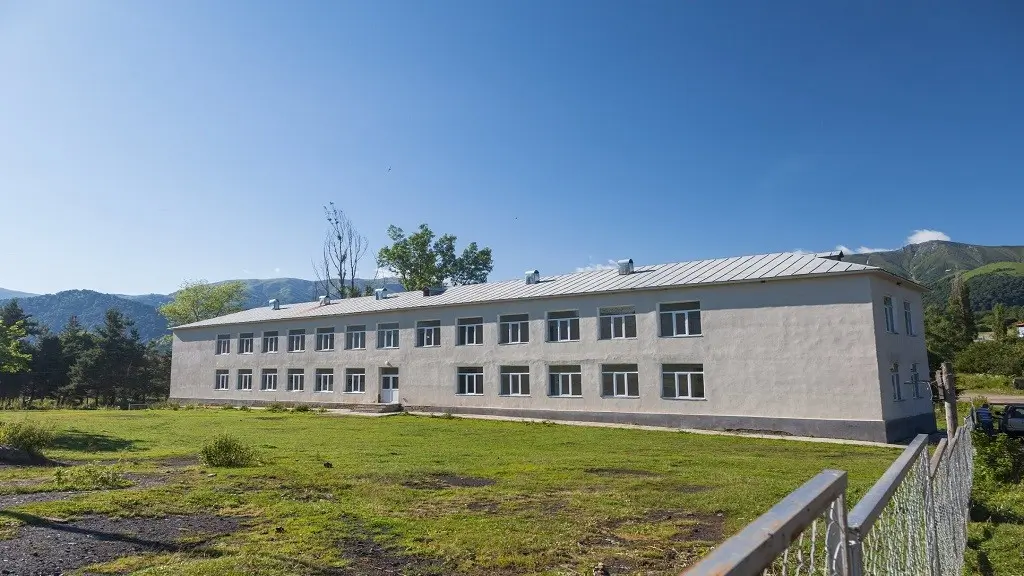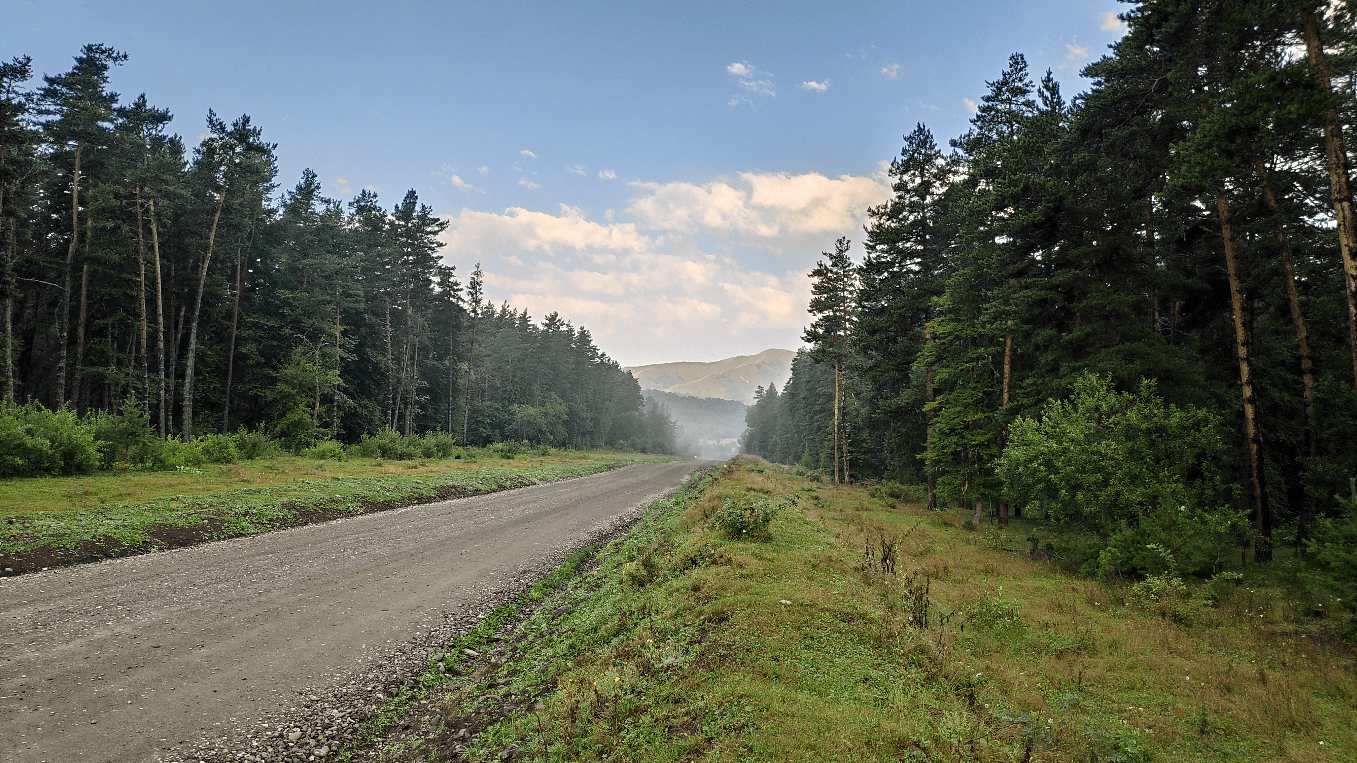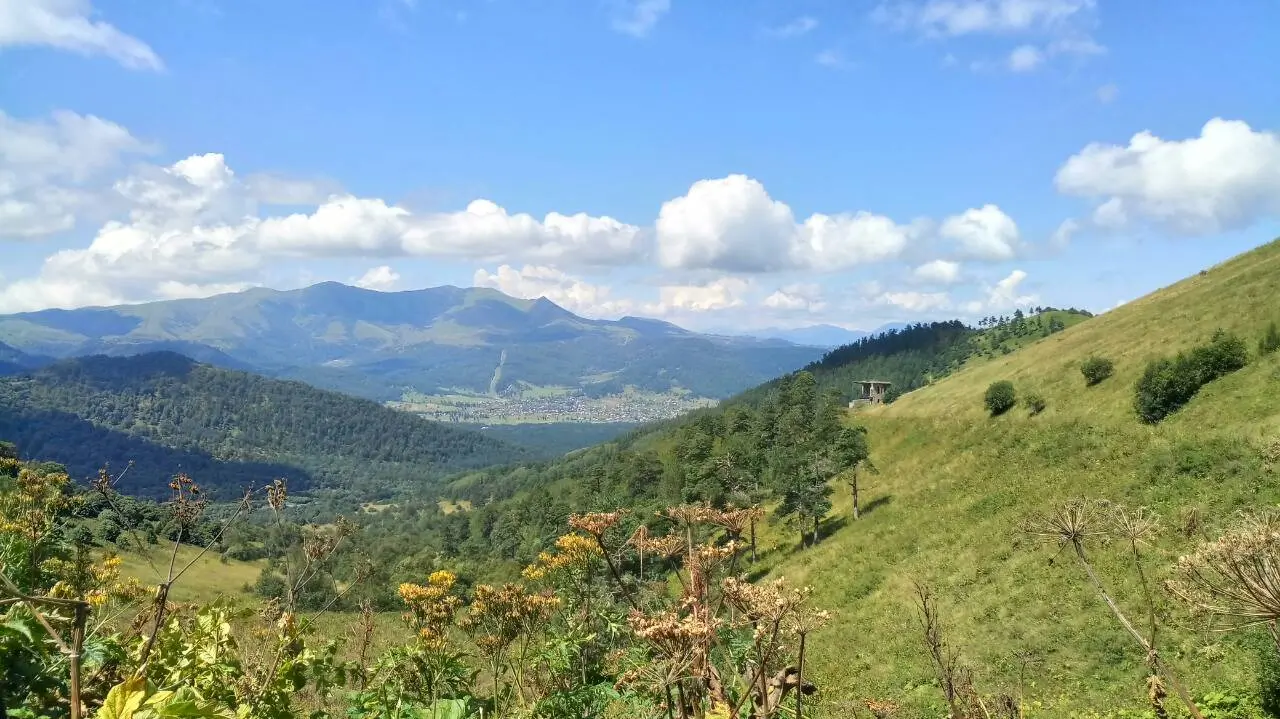Old school in Tsikhisjvari village:

It all started with the fact that in the 1960s, Chamber of Commerce and Industry of the USSR in the consular department at the USSR Embassy in Turkey, headed by Irakli Panaetovich Sevastov. Irakli Panaetovych made a huge contribution to that difficult work, which is given at the end of this article.. And the country's leadership highly appreciated the merits of Irakli Panaetovich. Vasily Pavlovich Mzhavanadze worked as the first secretary of the Central Committee of the Communist Party of Georgia at that time.. Who highly appreciated the work of I.P.. Sevastov at the Chamber of Commerce and Industry in Turkey ( department of oil products and energy). I called I.P. Sevastov to his office., and asked directly.... Irakly Panaetovich, we appreciate your contribution to our work, so for your services to the country, ask whatever you want, and we will give you. Want an apartment in Moscow, in Tbilisi, whatever you want, You deserve it. Irakly Panaetovich Sevastov replied: Vasily Pavlovich, I don't need any awards or any apartments, All I need, this is what I will ask you to help my village Tsikhisjvari, where i was born and raised. In my native village, no proper school, no club and no road. If you help build it all, this will be the most precious reward for me. And Vasily Pavlovich Mzhavanadze fulfilled his promise. In the city of Tbilisi, another native and patriot of the village of Tsikhisjvari worked in leadership positions in a construction trust, Zurelidi Haralampius. Who was instructed to build it all. And in 1968 year the school accepted its first students, the road to the center was paved, and c 1970 the club began its work in the village of Tsikhisjvari. These are the patriots, who were not guided by personal gain, but they did everything, to somehow help their fellow villagers, your village, everyone should remember, and pass on their names to their generations. It's important today more than ever. What were the personalities!!!
PS: Unfortunately, we failed to find a photo of Irakli Panetovich Sevastov. If anyone has a photo, and if possible, contact the site administration, to add a photo to the article.
New school in Tsikhisjvari village:

A little history, which laid the foundation for the construction of a new school in the village of Tsikhisjvari..
The following is the work in which Irakli Panaetovich Sevastov took an active part. And his merits were noted by the leadership of the country.
As known, in 1945–46. the Soviet government presented some territorial claims of the USSR to Turkey. These claims led to the need to restore the Russian-Turkish border 1914 year and the reunification of some Turkish cities - Erzurum, Bath, Bitlis and Eleshkirt - with Armenia. In addition to the basic requirements, the USSR turned to Turkey with a note from 7 august 1946 G., which spoke of control over the Black Sea straits. Under these conditions, Turkey, respectively, did not want to make efforts to normalize relations with the USSR. Military coup in Turkey 27 May 1960 r. and the coming to power of Cemal Gursel allowed the Soviet leadership to officially recognize the new Turkish government and express hopes for the establishment of "good neighborly relations between Turkey and the Soviet Union, based on mutual respect, that could develop in conditions of international peace and security” After the end of World War II until the early 1960s. Soviet-Turkish relations remained within a limited foreign trade framework. The share of the USSR in Turkish imports in 1948–1959 was. only hundredths of a percent, and by the end of the 1950s. barely exceeded 1%. A similar situation was with Turkish exports. . However, since 1960 on 1969 r. very important and dramatic changes were observed in these relations. There are two main reasons behind these positive changes.: first, complexity of the situation, in which the Turkish economy was located (difficulties in finding new financial resources in the world market, depreciation of the national currency, lack of competitive heavy industry ); And the second disagreement between Turkey and the Western world, especially with the USA. Despite anti-Soviet campaigns, conducted by the Turkish media, on the reduction of the volume of economic assistance to the countries of Asia and Africa, slander about the plight of the Turkic peoples, living in the USSR, The Turkish government decides to delegate representatives of Turkish business circles to the Soviet Union. In November 1960 r. eminent Turkish industrialists and bankers visited Soviet enterprises and met with the heads of Soviet foreign trade associations. Since April 1961 r. The USSR initiated negotiations on the revision of the Soviet-Turkish railway convention of 1922 r. and on direct railway communication between the Soviet Union and Turkey. Agreement dated 27 April 1961 r. established the regulations for the transportation of goods and passengers across the border on the Kars-Leninakan section. The next step was the conclusion in June 1962 years of agreement on the establishment of telephone communications between the USSR and Turkey. The key factor in the readiness of Turkish statesmen to accept economic and technical assistance from the Soviet Union was Turkish public opinion., which recognized the expediency of developing good neighborly relations in the socio-economic sphere, increased criticism of the unilateral orientation of Turkish foreign policy towards the Western world. Statements by deputy Joshkur Kardzha about the benefits of Soviet economic assistance were positively received even by opponents of rapprochement with the "northern neighbor". In this way, The first important event in the beginning of Soviet-Turkish economic cooperation of this period was the official visit of Turkish Foreign Minister Feridun Cemal Erikin to Moscow with 30 October to 6 November 1964 r. During this visit, the development of Soviet-Turkish economic relations was discussed and an agreement was signed on cultural cooperation and exchange. In a joint declaration, which was published after the visit of the Turkish Minister, both sides expressed their desire to develop Soviet-Turkish cooperation in economic terms: "Different topics, which are connected with the development of Soviet-Turkish economic relations, discussed by delegations. The parties agreed that, what goods, that the USSR needs (especially tobacco, hazelnuts and citrus fruits), more will be imported from Turkey. And Turkey, in its turn, will buy industrial goods and equipment from the USSR, including drilling rigs, building materials and machinery” In the joint declaration, which was published said, that the parties stressed the importance of developing political, trade and economic relations between the USSR and Turkey. After this important visit, joint work was continued, and 25 Martha 1967 r. An agreement on economic and technical cooperation was signed between Ankara and Moscow. This agreement provided for the opening of- which large enterprises in Turkey with the financial and technical support of the USSR, provision of industrial equipment, technical services and payment terms . Agreement on economic cooperation between the USSR and Turkey 25 Martha 1967 r. consisted of 12 items and applications. According to the agreement, USSR provided equipment, technical support and financial assistance for the implementation of large industrial projects in Turkey. Factories and enterprises, which were included in this agreement., these are:
1. One integrated steel plant (power 1 million tons per year).
2. One aluminum smelter and one hydroelectric power plant (in the appendix of the contract, the capacity of the aluminum smelter is defined as 60000 tons of aluminum and 25000 tons of raw materials per year;
Besides, hydroelectric power, which will provide electricity to this aluminum plant, to be determined between the parties later).
3. One oil refinery (power 3 million tons of crude oil per year).
4. One sulfuric acid plant (power 120000 tons per year).
5. One plant for the production of fibreboard (power 28000 tons per year).
6. Expansion of the glass factory in the town of Chaiyrova.
7. Expansion of the Istanbul alcohol plant (addition of a new department for the production of Russian vodka with a capacity of 2 million liters per year) .
At subsequent negotiations after the signing of this agreement, the parties agreed that, that an integrated steel plant will be built in the city of Iskenderun, aluminum plant - in the city of Seydisehir, oil refinery - in the city of Aliaga, a sulfuric acid plant in the city of Bandirma and a plate mill plant in the city of Artvin. Two projects in the cities of Chayirov and Istanbul (glass factory expansion and alcohol factory respectively) were canceled.
The second paragraph of the agreement stated, that the estimated amount of payment for Soviet technical support and industrial equipment will not exceed 200 million dollars. Together with that, if the estimated total amount is higher 200 million dollars, then the excess part will be paid with the interest rate 2.5%, and the term for payment of the excess part will also be determined in future negotiations between the parties. Soviet credit for 200 million dollars will be paid in Turkish national goods after the opening of these factories within 15 years with an interest rate 2.5%. To repay the debt, the Turkish government will open a special account called "Special Account of the Foreign Trade Bank of the USSR" in the Central Bank of Turkey. Sums, which will be credited to this account, will be used to export Turkish national products, including hazelnuts, tobacco, raisin, citrus, olive oil, fresh fruits and vegetables, cotton, shoes, fur, jersey, ores, other agricultural and food products . Following the signing of this important treaty, Turkish Prime Minister Suleyman Demirel paid a working visit to 19 on 29 september 1967 r. Moscow and discussed with the Chairman of the Council of Ministers of the USSR A.N.. Kosygin key issues of Soviet-Turkish economic cooperation. In a joint declaration, which was published after the visit of S.. Demirel, said: that the development of Soviet-Turkish trade and economic relations in the near future will bring mutual benefit and benefit and serve to strengthen friendship between the peoples of the USSR and Turkey.
And what does all this have to do with the construction of a school in the village of Tsikhisjvari?. Of course, all this could not have been written, many will be outraged why all this demagoguery. But believe, all this is needed, to understand how much work has been done, and what did they ask for in return, people for whom the native village, remained the same family and friends, no matter what positions remained ordinary people.
PS: Dear fellow villagers and guests of the village of Tsikhisjvari, maybe someone has information that will complement this article, or make some changes , then please write in the comments or write to us for correction.









